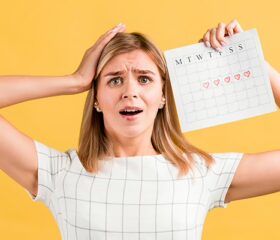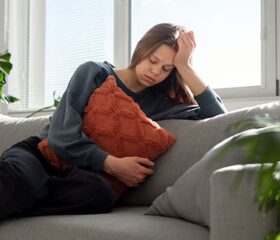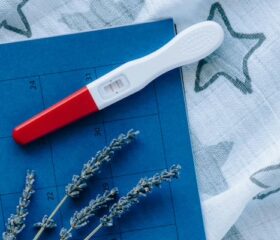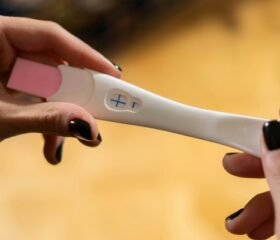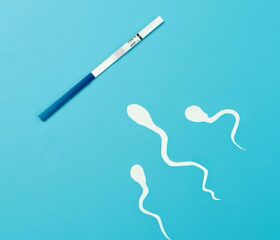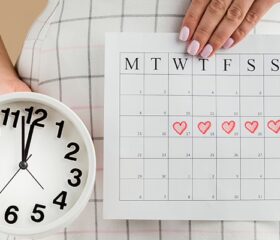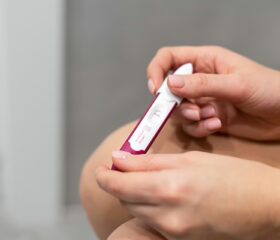Ovulation Fatigue: Does Ovulation Make You Feel Tired?
Life can be tiring even at the best of times, but have you noticed you’re feeling especially fatigued around the same time each month? It could be a sign that you’re ovulating.

Many women find ovulation both mentally and physically draining, so if you’re dealing with recurring bouts of fatigue, your monthly cycle could be the culprit. If so, that doesn’t mean there’s anything wrong with you—it’s perfectly normal.
Read on to learn more about what ovulation is, why it can cause fatigue, and what you can do to manage those monthly energy dips.
What is ovulation?
As you may remember from science class, ovulation is the phase in your menstrual cycle when your ovaries release a mature egg (i.e., one that’s ready to be fertilized).
The release of your egg coincides with a spike in several hormones. If ovulation makes you feel especially tired, these chemicals are probably responsible.
What hormones are released during ovulation?
Ovulation is associated with four hormones:
- Follicle-stimulating hormone: In the week or so before you ovulate, your body produces something called follicle-stimulating hormone (FSH), which tells your ovaries to mature several follicles, the fluid-filled sacs that contain eggs.
- Estrogen: As these follicles mature, they produce increasing levels of another hormone that you’ve probably already heard of—estrogen.
- Luteinizing hormone: Eventually, your estrogen levels peak, which triggers a surge of luteinizing hormone (LH). LH causes one of the follicles to release a mature egg, which travels down your fallopian tube until it reaches the uterus, where it waits for sperm to fertilize it.
- Progesterone: After ovulation, your levels of estrogen decline, and your body begins producing yet another hormone called progesterone. This thickens your uterine lining so that a fertilized egg can implant in it. 1
Again, this monthly hormonal sequence is what makes many women feel fatigued during ovulation.
Why does ovulation cause fatigue?
The main hormonal culprits behind ovulation fatigue are usually estrogen and progesterone.
Estrogen can actually boost your energy levels (as well as your libido), so in the days leading up to ovulation, you might feel your best. However, this peak is followed by a significant drop in estrogen immediately after the egg is released. The departure of this energy-booster may leave you feeling wiped out.
What’s more, some people claim that progesterone, the hormone that spikes immediately afterward, is associated with feelings of relaxation and can have a mild sedative effect. There isn’t much hard scientific evidence for this, but some experts do believe that progesterone can cause insomnia (lack of sleep). For obvious reasons, this may leave you feeling fatigued shortly after you ovulate every month. 2
What else can cause fatigue every month?
While hormonal fluctuations can cause ovulation fatigue, they’re far from the only factor that can impact your energy levels. You could also be feeling tired due to:
Premenstrual syndrome (PMS)
You’re probably already familiar with PMS, a set of symptoms that may set in right before your period arrives (i.e., after you ovulate). The symptoms of PMS can include: 3
- Mood swings (including feelings of sadness or irritability)
- Headaches
- Cramps
- Fatigue
Even if tiredness isn’t one of your PMS symptoms, it can be indirectly caused by the others. After all, almost nobody feels energetic when they’re contending with headaches and mood swings.
PMS-related fatigue is easy to confuse with ovulation fatigue because it’s also tied to your menstrual cycle and will occur around the same time every month (assuming you have a regular cycle).
Other lifestyle factors
Of course, if you’re frequently tired, it’s also possible that it has nothing to do with ovulation or menstruation at all. Chronic fatigue can also be caused by:
- Illness
- Stress and overwork
- A lack of sleep
- Excessive alcohol consumption
- An imbalanced diet
- A sedentary lifestyle
Moreover, certain medications, such as sedatives or antihistamines, can make you fatigued. 4 All of these factors are possible culprits at all times, not just during and after ovulation, but they may make the menstrual symptoms we just described even worse.
How can you tell if your fatigue is being caused by ovulation?
It can be hard to tell the difference between ovulation-induced fatigue and tiredness that stems from something else, like just being sick.
If you notice your fatigue occurring consistently around the middle of your cycle, especially when it’s accompanied by other ovulation symptoms, there’s a good chance (although not a certainty) that it’s related to the hormonal shifts we mentioned.
Other common symptoms of ovulation
The signs that could point towards ovulation include: 5
- Changes in your cervical mucus: When you ovulate, you may notice an increase in clear, slippery, and stretchy cervical mucus. Many women say it has the consistency of raw egg whites.
- Mild pelvic pain (Mittelschmerz): Some women experience a twinge or mild cramping on one side of the lower abdomen during ovulation.
- Breast tenderness: Your breasts might feel more sensitive or tender to the touch.
- Light spotting: A small amount of light bleeding or spotting can occur around ovulation.
- Increased sex drive: The estrogen surge before ovulation can sometimes lead to a temporary increase in libido—although by the time your fatigue sets in, this may have passed.
Note that while many women experience these symptoms, each body is different. You might have very subtle symptoms around the time you’re ovulating, or even none at all.
How long does ovulation fatigue last?
If your fatigue is directly related to ovulation, you’ll be glad to hear that it shouldn’t last for more than a day or two. With that said, you could segue directly from ovulation fatigue into your PMS symptoms, which could prolong your bout of fatigue.
If you consistently feel exhausted for longer periods, it could be due to other factors, like illness or a nutritional deficiency, and you should get in touch with your doctor.
How to manage ovulation fatigue and boost your energy
While ovulation fatigue is often a natural part of a woman’s cycle, you can still take a few simple steps to manage your energy levels and feel more like yourself during this time.
Make lifestyle adjustments
Small yet consistent changes to your daily routine often make a significant difference.
- Sleep: Ensure you get at least 7–9 hours of quality sleep each night. If this is a challenge, create a relaxing bedtime routine, keep your bedroom dark and cool, and avoid screens before bed. Also, do your best to go outside during the day instead of spending all your time indoors—this will help your body adjust its natural melatonin production. 6
- Exercise: While it might seem counterintuitive when you’re tired, gentle exercise like walking, yoga, or swimming can actually boost your energy levels and help you sleep better.
- Stress: Since stress can often cause or exacerbate fatigue, try out stress-reducing activities such as meditation, deep breathing exercises, or even just reading a good book or spending time in nature.
Eat well
Along with simple lifestyle changes, fixing up your diet is also a way to combat fatigue. A balanced diet full of complex carbs, lean proteins, fruits, and vegetables is the way to go. You should also add plenty of iron to your diet, since a lack of it can lead to fatigue.
While it may be tempting to resort to sugary snacks when you’re feeling tired, they’ll only give you a temporary boost, and they aren’t good for your body, so enjoy them in moderation. Likewise, caffeine only provides a short-lived energy boost, and you may have a crash or trouble sleeping later on. It’s fine to drink caffeinated beverages if you enjoy them, but try not to use them as a crutch.
You’re also more likely to be fatigued if you’re dehydrated, so drink plenty of water throughout the day.
Try tracking your cycle to get a handle on your monthly fatigue
If you routinely feel fatigued, why not try tracking your ovulation? This lets you know when you’re most likely to ovulate so that you can prepare for the incoming fatigue by limiting strenuous activities during these times. You can use ovulation test strips to gauge when you’re ovulating and a fertility-tracking app or ovulation calculator to (roughly) predict when it’ll happen each month.
When to speak to your doctor
While mild to moderate fatigue around ovulation can be normal, tiredness can sometimes be a sign of an underlying health concern.
Consult a doctor if your fatigue is severe enough to impact your daily life or if it lasts longer than a few days. You should also let your doctor know if you experience:
- Dizziness
- Blurred vision
- Confusion
- Slower-than-usual heart rate
These could indicate conditions unrelated to ovulation, such as anemia, thyroid disorders, or chronic fatigue syndrome. 7 8
Final thoughts
No one likes to feel tired all the time. If ovulation is causing fatigue, it’s only natural to feel frustrated by this recurring energy dip.
Fortunately, by making a few simple lifestyle changes and listening to your body, you can manage your tiredness—to an extent, at least—and get your energy levels back on track.
Article Sources
- American Pregnancy Association. "What is Ovulation?" Retrieved May 27, 2025.
- Dr. Sherry. "If You're Feeling Exhausted During Ovulation, Here's What's Really Happening" Retrieved May 27, 2025.
- American College of Obstetricians and Gynecologists. "Premenstrual Syndrome (PMS)" Retrieved May 27, 2025.
- Cleveland Clinic. "Fatigue" Retrieved May 27, 2025.
- American Pregnancy Association. "Ovulation Symptoms – Am I Ovulating?" Retrieved May 27, 2025.
- Journal of Health Psychology. "Does sunlight exposure predict next-night sleep? A daily diary study among U.S. adults" Retrieved May 27, 2025.
- Cleveland Clinic. "Anemia" Retrieved May 27, 2025.
- Cleveland Clinic. "Thyroid Disease" Retrieved May 27, 2025.
